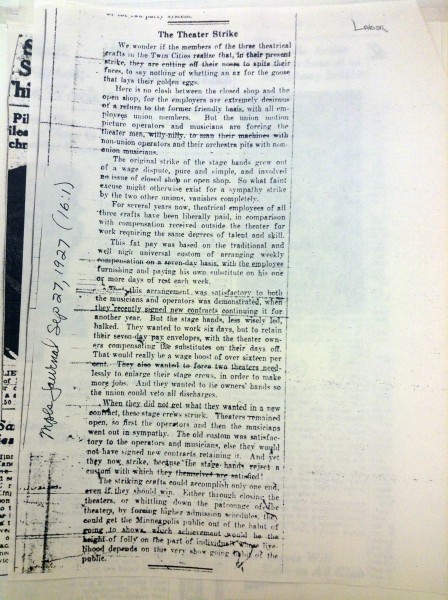| Artifact Type | Mainstream Media, Sources |
| Publication | Minneapolis Journal |
| Page Number | 16 |
| Place | Minneapolis, MN |
| Publication Date | September 27, 1927 |
| Transcript | Show/Hide |
|
Headline: “The Theater Strike” We wonder if the members of the three theatrical crafts in the Twin Cities realize that, in their present strike, they are cutting off their noses to spite their faces, to say nothing of whetting an ax for the good that lays their golden eggs. Here is no clash between the closed shop and the open shop, for the employers are extremely desirous of a return to the former friendly basis, with all employees union members. But the union motion picture operators and musicians are forcing the theater men, willy-nilly, to man their machines with non-union operators and their orchestra pits with non-union musicians. The original strike of the stage hands grew out of a wage disput, pure and simple, and involved no issue of closed shop or open shop. So what faint excuse might otherwise exist for a sympathy strike by the other unions, vanishes completely. For several years now, theatrical employees of all three crafts have been liberally paid, in comparison with compensation received outside the theater for work requiring the same degrees of talent and skill. This fat pay was based on the traditional and well night universal custom of arranging weekly compensation on a seven-day basis, with the employee furnishing and paying his own substitute on his one or more days of rest each week. That this arrangement was satisfactory to both the musicians and operators was demonstrated, when they recently signed new contracts continuity it for another year. But the stage hands, less wisely led, balked. They wanted to work six days, but to retain their seven-day pay envelopes, with the theater owners compensating the substitutes on their days off. That would really be a wage boost of over sixteen per cent. They also wanted to force two theaters needlessly to enlarge their stage crews, in order to make more jobs. And they wanted to tie owners’ hands so the union could veto all discharges. When they did not get what they wanted in a new contract, these stage crews struck. Theaters remained open, so first the operators and then the musicians went out in sympathy. The old custom was satisfactory to the operators and musicians, else they would not have signed new contracts retaining it. And yet they now strike, because the stage hands reject a custom with which they themselves are satisfied! The striking crafts could accomplish only one end, even if they should win. Either through closing the theaters, or whittling down the patronage of the theaters, by forcing higher admission schedules, they could get the Minneapolis public out of the habit of going to shows, which achievement would be the height of folly on the part of individuals whose livelihood depends on this very show-going habit of the public. |
|
| Archive | Minnesota Historical Society |
| Citation | “The Theater Strike,” Minneapolis Journal, September 27, 1927. |
| Location | MinneapolisMinnesota |
| Tags | |
